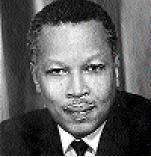
A gentle giant and a voice for the people, this is how The Most Honourable Hugh Lawson Shearer is remembered by many.
The suave leader became the country's third prime minister taking office 1967 after the passing of Donald Sangster. He served in the capacity until 1972.
He is renowned for defending the rights of the working class man as a union representative at the Bustamante Industrial Trade Union (BITU). A key figure in trade union circles next to Sir Alexander Bustamante, Mr. Shearer was appointed island supervisor in 1953. In 1960, he was elected vice-president of the BITU. After serving as prime minister and leader of the opposition, Mr. Shearer returned to the BITU and became the organisation's president in 1977.
But trade unionism was not his only passion. He had a deep interest in the education of the Jamaican people and during his tenure as prime minister, he doubled the secondary school system by adding 60 new schools.
Mr. Shearer died on July 5, 2004, he was 81.
- Y. S.
Interesting facts
He was the youngest person to become prime minister of Jamaica at the age of 44.
As a young boy, he was referred to as Son Lindo. It was not until he was appointed prime minister at age 44 that people from Martha Brae, the place of his birth learnt his full name.
He was prime minister at the time when Jamaica's two largest foreign exchange earners, mining and tourism, were constructed/started. During that time, three alumina refineries and three hotels were constructed.
He was a trainee journalist understudying Lynden G. Newland, editor of the Jamaica Worker,the newspaper of the Bustamante Industrial Trade Union (BITU). He later became editor of the same paper.
Where mathematics was concerned, Shearer could add, multiply, divide, subtract and calculate whether it was a simple sum or a complicated exercise ... by closing eyes a brief moment and reach an answer quicker than a calculating machine could - as described by Hartley Neita's, A voice for the people.
Famous quote:
"Our trade union movement has not only preserved the rights and liberties of the working man and his family, but has also made a major contribution to the re-distribution of the resources and incomes produced in the society. Indeed, the trade union movement is probably more advanced and more developed in Jamaica than in any other country in the world. I am now telling all Jamaica that our country owes a great deal of gratitude to the trade union movement for the preservation of our democratic rights."

